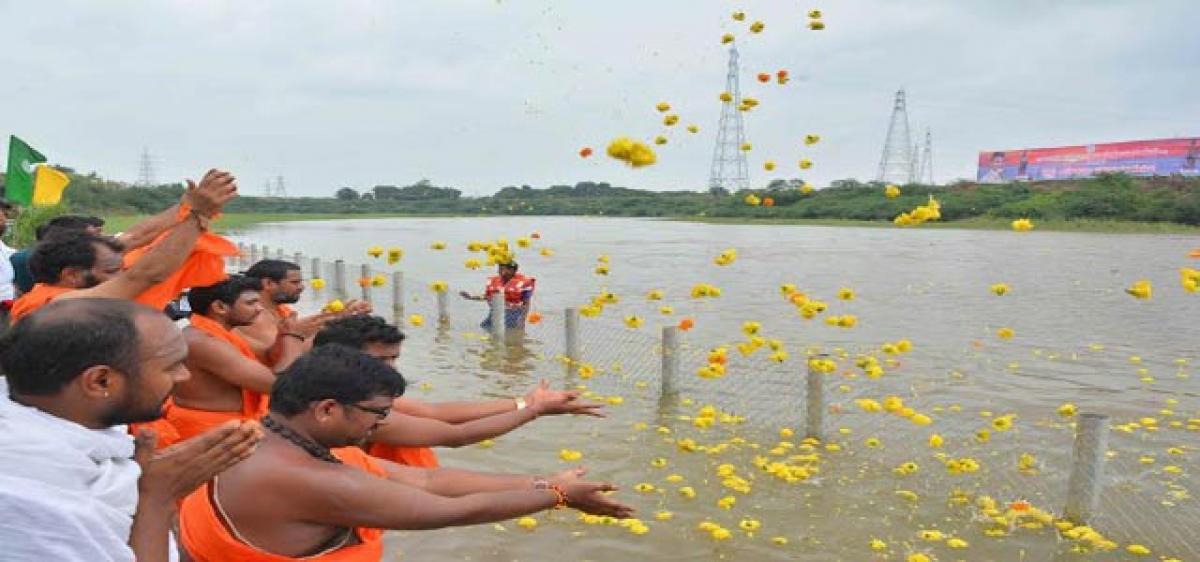Live
- Surge in construction of illegal farmhouses in Aravallis, Sohna Council issues notice
- Karnataka BJP Criticizes Siddaramaiah Over Wayanad Housing Project
- Lathi-charge on students in Hazaribagh kicks up political row; demand for CBI probe grows
- India’s growth to rebound to 7 pc in 2025-26: Report
- Union Minister Rammohan Naidu inaugurates Airport Predictive Operation Center in Hyderabad
- Delhi has decided to elect BJP CM, oust AAP govt: Harsh Malhotra
- Congress-led UDF winning streak continues in Kerala, ruling CPI-M-led Left suffers reversal
- The Key Players Behind IPL: Discover the Franchise Owners and Their Success Stories
- Harris and Gill join Sydney Thunders for WBBL 11
- PKL Season 11: Bengal Warriorz coach Surve aims for maximum points to secure playoff spot
Just In

On 26th December, TS Irrigation Minister T Harish Rao informed the Assembly that around 3,000 TMCFT water on an average is going into the sea.
On 26th December, TS Irrigation Minister T Harish Rao informed the Assembly that around 3,000 TMCFT water on an average is going into the sea. At the same time in AP, at a function relating to Polavaram project, both the central and the state ministers stressed the importance of Godavari water.
With the Bachawat Tribunal award on Krishna River water sharing, the two Telugu States were allowed to use surplus water and were allowed a carryover water of 150 TMCFT. Accordingly, AP was allotted 811 TMCFT.
This was divided among Rayalaseema, Telangana and Coastal Andhra in around 1:2:3 ratio (with 5 TMCFT to Chennai). In the case of surplus water, 150 TMCFT goes as carryover in the dams for use in deficit years. AP government allocated 227.5 TMCFT of surplus water (when available only) to 7 projects in the three regions. In 2013 the AP Irrigation Minister released project-wise allocations.
However, these allocations will be drastically affected by the Justice Brijesh Kumar Tribunal Award of 2013. Surplus water availability and 150 TMCFT of carryover will be a rarity to two Telugu states. The fact is that under this award the two Telugu states will be getting their share at the “will and pleasure” of Karnataka as the Tribunal distributed more water to two upper riparian states and also allowed Karnataka to store more water on fictitious grounds.
If the Justice Brijesh Kumar Tribunal award is implemented, the dry regions of AP and four districts [old] of Telangana will turn into deserts in no time with the coming 50 years being the frequent drought-prone period. We must remember the fact that rainfall is seasonal and highly variable with years. We can see this openly with N’Sagar wherein only in few years water reached full capacity after 2001.
In this scenario, the two Telugu states must get succour from Godavari River water, though there are politics involved in it. Though Telangana has sustainable water resources from Godavari River, it stopped all major plans of utilising Godavari waters in Krishna Basin such as Pranahita-Chevella, wherein the water use is limited to Godavari basin only.
At the same time, it proposed projects in Krishna basin on fictitious water availability [150 TMCFT] saying that undivided AP government initiated them, forgetting the fact that they were designed for not even 10% of the present project designs. The TS government has planned to convert the existing drinking water reservoirs in Hyderabad into real estate ventures and as a result even the groundwater will be turned into polluted water. In fact the two reservoirs provide water directly and indirectly [through groundwater].
The AP government talks something but does something else with Godavari water use in Krishna basin. Though the government says it will divert Godavari waters to projects in dry areas of AP, in reality it is planned to use this water in Krishna and Guntur districts wherein the new capital city and industrial and other infrastructure projects are planned.
As part of this Pattiseema lift irrigation was introduced instead of completing the main Polavaram projects with right and left canals which are nearly ready to carry water. Under this scenario, completion of Polavaram project and the basic infrastructure to take water to dry areas in Krishna basin may take more than two Pushkaralu time.
There is a need that both the Telugu states must give priority, by keeping politics aside, to utilisation of Godavari water in Krishna basin to meet both the drinking and irrigation needs. This is the only solution on long-term basis in view of growing population and urbanisation. To supplement, there is a need to use wastewater generated in urban areas around 75% of the water used in urban areas goes as waste water.
Also, both the Telugu states must come together and fight in the Supreme Court against the injustice done by the Tribunal on technical grounds and not on legal grounds by asking the court to appoint a technical committee to review the “Technical Fraud” enacted by the Tribunal to favour Karnataka. In fact, I myself submitted this to the three successive CJs of SC and as well brought to the notices of the Prime Minister and the President of India along with the two Telugu states irrigation departments. (Writer is Convener, Forum for a Sustainable Environment)
By Dr S Jeevananda Reddy

© 2024 Hyderabad Media House Limited/The Hans India. All rights reserved. Powered by hocalwire.com







